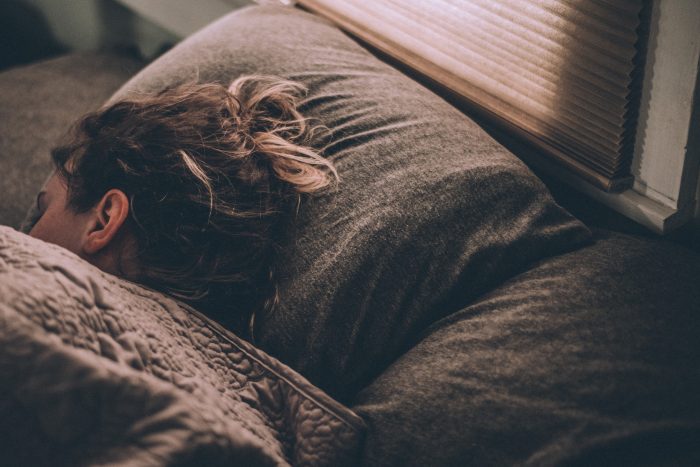This is not a story about someone fighting for their lives in an ICU ward or suffering from months of long Covid like, many have and still are.
I am double-vaccinated and boostered, and I tested positive a few weeks ago with the Omicron variant.
Many around me had the same and were symptomless or complained about mild headaches or a day of feeling off. With that in mind, I was planning to continue with my life from the comfort of my own home and a pack of lateral flow tests in my drawer.
But I was surprised to realize that in my case, it did hit me a little bit harder.
Without running through each individual symptom, I only had a couple of days where I fell ill in a way that I was flat out in bed. But there was a build-up to that point and then a good two weeks of extreme fatigue and exhaustion that randomly hit me at any given hour of the day. Unlike a common cold where you can choose not to listen to your body and just override its urge to rest, with Covid, there was no such option. I felt so exhausted that I just fell into the bed and was asleep within a few minutes.
With this enforced state of rest and recovery, I had quite some time to observe things about myself and my coping strategies that I had successfully managed to bury under the endless stream of my day-to-day distractions.
Here are what hit me in the face as I was staring out the window with my hot water bottle, Haribos, and peppermint tea:
1. Addiction to our self-enforced routines
When the pandemic hit, I decided that the most important thing for our family was to stick to some sort of daily routine, not just for the children’s well-being, but for our own sanity, too.
I think that served us extremely well. Children need routine to feel safe and in a rudimentary way, and so did I. We offered each other an hour of downtime each day for exercise or a walk on our own amidst the home-schooling, cooking, and general anxiety. And as a result, we embarked on our highly structured days as the world around us was enveloped by this ever-increasing pandemic.
Routine and self-imposed discipline give us (while many would argue otherwise) a sense of security.
As long as we do our run in the morning or cook before 2 p.m., everything is okay. But of course, it isn’t and it really does not matter whether you run on a Monday or a Tuesday or whether you put the bins out in the evening or in the morning. But rational thinking and emotional attachment rarely go hand in hand, unless we start to mindfully become aware of it, and I just did not realize it.
Following our habitual patterns also means we do not have to spend time thinking about how we can make things work in a different way. It saves time and energy to go with the tried and tested. And time and energy were in short supply during the lockdown. So, I bulldozed through the pandemic on autopilot in a carefully crafted mix of self-preservation and childhood conditioning. “Pull yourself together and push through” meets “make sure the kids are alright and do not notice the stresses and fears of the outer world.”
As the infamous Covid fatigue set in, I resisted it with all my might. I put on my yoga pants, rolled my mat out, and shouted down the stairs, “I am just going to do some light stretching.” But it did not work. Two sun salutations and my heart was banging against my ribs like a prisoner desperate to escape, and I just had to lie back down.
A little while later, I put on the music and started to cook. There, too, I realized I was quite weak. However, I simply could not defrost any food. It still had to be the home-cooked stuff. I cooked as if my life depended on it with a musical reminder from the Beatles to “Let it be,” turned the hob off , and hobbled up the stairs. But not before I took a sarcastic glimpse in the mirror as I shovelled past it. “So, this is what you will look like when you are 90. Lovely,” and crashed on my bed.
I was so addicted. I was willing to override my own warning signals only to continue with something that, in the grand scheme of things, will have near to no impact on me or my environment.
This was not about healthy food or yoga. This was just about me and my own attachment to it. And I risked my own recovery for it.
Had it just been a bad cold, I would not have learned that lesson. I probably would have pushed through and then accepted that recovery would be delayed by a few days.
2. The guilt we do not know we carry
My husband stepped up and stepped out in ways that surprised me: shopping for food, running school and family errands. He took on my part of the bargain just like I would have done if the shoe were on the other foot. I could have just made the most of it, with Netflix and a good book. But I felt guilty.
When I heard him come back in with the shopping bags, I scrambled down the stairs to start unpacking them only to realize, once more, how unwise that was, so I went back upstairs.
I felt guilty that I couldn’t read my children bedtime stories or dry their hair or pack their lunches.
Rationally, I tried to tell myself that this is likely to be a matter of four to six days and that my reaction was phenomenally biased. But emotionally, it did not alleviate the guilt. I just could not let it go.
The feeling of guilt comes from the expectations we think are thrust upon us and our perceived lack of fulfilling them. Those expectations are a combination of societal norms, our upbringing, and the way we would like to be seen by the group of society we identify with. In return, the feeling of guilt then boosts our own moral compliance with whatever our values or beliefs would push for. This, on its own, is a questionably harsh structure to query, especially if the beliefs contradict our own true nature or preference.
But now with the pandemic and lockdown, our primal survival instinct kicks in, and for many of us who have never experienced extreme events such as war, terrorism, or serious scarcity, that makes it an entirely new experience.
How much of our subsequent decisions is based on rational strategies and how much is driven by fear-based thinking? Just remind yourself of the toilet paper shortage and you have your answer.
I surprised myself by how natural this gripping kicked in within myself. I loved it. Finally, I found an excuse to let my inner controller take over. And it did a good job. The survival instinct is there for a reason. But how do you let go again?
Becoming aware of it, I guess, is where it all begins.
We will notice how much we are hooked on it when we try to let something go. Often, it does not happen until it is imposed on us, by a change in circumstances perhaps, but we can just try to step out of our behavioral patterns and give something up from our stringent routine. Then, we can sit back and observe what happens next.
How much of it is driven by what we feel our bodies and minds really need and how much is driven by what we think we need to deliver?
3. The self-worth we attach to ourselves
Once I got over the fact that no yoga will be practiced, no lunch bags will be packed, and no emails will be answered for a little while longer, it felt like my body could relax a little more.
It dawned upon me that this was not a matter of three days but rather three weeks, and with that knowing, something has shifted. All of a sudden, I had time to be a little more embodied and explore why I have so much resistance within me. It was not coming from a judgmental expectant kind of perspective anymore, but from a curiosity to understand.
And after a little doze, I thought that all those things I clung to so desperately these past few days are the things I have decided define my being. How risky a strategy is that?
We will all become vulnerable, we will all grow old and frail (if so lucky), and illness will come in one shape or another. Attaching our self-worth to our physical strength, or our ability to perform at our peak, or to never drop a ball is going to fail us sooner or later.
Drop a ball and see what happens. It was scary and liberating for me, and all that happened from the comfort of my own bed.
I realized how much I needed rest and how my self-imposed guilt was denying me that.
My nervous system was in a constant state of underlying, albeit mild, stress. I was irritable to the extent that minor things that reoccur in any family structure wound me up in a way that was disproportionate to what had actually happened. You do not need to have a full-blown argument because someone put an empty jam jar back in the cupboard (although this really is annoying, isn’t it? Or is that also just me?).
A couple of weeks later, I gradually felt better. But it wasn’t a case of waking up and being back on track.
Each day, there was a little progress, but neither I nor anything else would speed it up. My body was in control of that and my only job was to listen. So the two of us took our first walk outside, hand in hand, and it was glorious. A few blocks at first and then a little longer.
We stepped on to the yoga mat together and nodded at each other “this will take a little time.”
I just remember feeling so much friendliness toward myself. May it last long.
I think it would be offensive to many to describe mild Covid as a retreat, especially if this were the only sentence plucked from this article. But to me, it did have certain qualities to it.
The stepping back and passive observation of oneself has certainly done me the world of good alongside the unpleasant coughing and fatigue of it all.
This was a silver lining of a Covid cloud.









Read 6 comments and reply